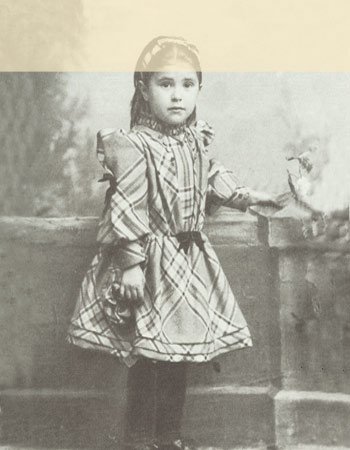The singer Frida Leider was born on April 18th 1888 during the 99-days reign of emperor Friedrich the 3rd in Berlin (more exactly: Granseer Str.9, close to Arkonaplatz) as daughter of carpenter Ernst Leider and his wife Anna, born Redlich. Although always poor, the hard working parents ensured an excellent education for her sole gifted child. The intended training for becoming a teacher however could not be completed because of the early death of her father. Instead she began her working career as a bank employee but soon she took the decision to become a singer and in spite of financial difficulties she clung to that idea.
After an education by different teachers - a period which was not always easy - she finally gave her debut in 1915 as Venus (Tannhäuser) in Halle. After several short engagements in Rostock and Königsberg she was finally engaged at the opera house in Hamburg. In the years 1919 to 1923 she built up a wide repertoire including so diverse roles as Bellinis Norma, the Countess in Figaro and Wagners Isolde. Many recordings with Deutsche Grammophon appeared also in these years. As early as 1921 her dream to be engaged at Berliner Staatsoper came true, allthough she had to wait until 1923 to fullfill this engagement because meanwhile she had become totally irreplaceable at the opera house in Hamburg.
After the first great successes in Berlin her international career began. She performed at La Scala di Milano (where she had to study the three roles of Brünnhilde in Italian language), Grand Opera de Paris, Wiener Staatsoper, in Munich and at many other important opera houses. From 1924 to 1938 she became the celebrated star of Wagner representations at the Royal Opera House Covent Garden in London, but she also represented Donna Anna (Mozart), Armida (Gluck) and was especially celebrated as Leonora in Verdis Trovatore at the same house.
At this time political events began to overshadow the career as well as the private life of the artist. Since 1930 Frida Leider was married to Professor Rudolf Deman, concertmaster of Berliner Staatskapelle. Deman was jewish and after Hitler’s seizure of power he and his wife got more and more under pressure. At the beginning his Austrian citizenship provided some protection, but after the "Anschluss" in 1938, the unification of the Austrian and the German state, Deman was in high danger and could flee to Switzerland only at the very last moment. The events of these days caused a severe psychological crisis for Frida Leider which prevented her from appearing on stage for a longer period of time. In her autobiography "Playing my part" which was published in 1959 the artist went over this difficult period in her life with kind neglect as she had to suffer a lot from colleagues very close to the Nazi regime. During the years of war Professor Michael Raucheisen, the famous pianist and accompanist, finally managed to arouse Frida Leider’s interest in a new artistic occupation, the singing of Lieder. Very quick again the artist reached the highest level of perfection. The registrations of Lieder from 1940 to 1944 are giving proof of this achievement until today and next to the Wagner registrations they remain as undeniable documents of this singular voice.
After the german capitulation in 1945 Leider is back in Berlin, having survived the bombs by staying in her country house at Pausin, a small village near Berlin. When the Russian army occupied this part of Germany they confiscated the house and Leider was obliged to turn back to her totally destroyed hometown. After destruction the Staatsoper found accommodation at Admiralspalast as a temporary solution and started playing again under incredible primitive conditions. Leider was offered another contract as high dramatic soprano, but at this difficult time she opted for a completely different challenge: she led the singing studio of Staatsoper until 1952 and she directed some operas, "Tristan and Isolde" with Wilhelm Furtwängler as conductor among them. This event became one of the highlights in after-war Berlin opera history. Leider finally worked as professor for singing at the Berlin college of music from 1948 to 1958. Her last public appearance as a singer took place - contrary to other sources - in a concert at Renaissance Theatre together with her colleague and friend Margarete Klose on February 10th, 1946.
Frida Leider died after a rich and full life on June 4th, 1975 in her hometown Berlin. She rests in a grave of honour at the Heerstraße cemetery, close to the Olympic stadium.


